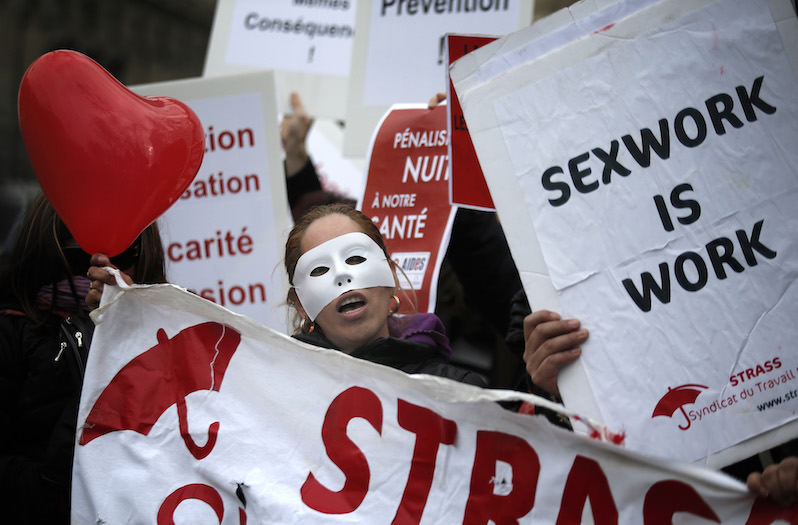How Prostitution Became the World’s Most Modern Profession
There is considerable difference between the reality for those caught up in the sex trade and the rhetoric promoted by sex-workers unions and pro-prostitution advocates—including feminists. A demonstrator outside the National Assembly in Paris in 2013, as a French bill aimed at decriminalizing prostitutes and fining their customers was meeting strong opposition in the Senate. (Christophe Ena / AP Photo)
A demonstrator outside the National Assembly in Paris in 2013, as a French bill aimed at decriminalizing prostitutes and fining their customers was meeting strong opposition in the Senate. (Christophe Ena / AP Photo)
By Kajsa Ekis Ekman
When it came to light that the vice president of one of the “sex-workers organizations” consulted by Amnesty International over its prostitution policy was a sentenced human trafficker and pimp, many abolitionists were appalled, but not surprised. “Sex-workers rights” has increasingly become a euphemism for the rights of pimps, brothel owners and men who pay for sex.
The “sex work” discourse has turned the world’s oldest profession into the world’s most modern profession. Prostitution is no longer seen as a feudal, patriarchal remnant—it is subversive, liberating, even feminist. To the women’s movement, prostitution was sold as a woman’s right to her own body; to neoliberals, as a symbol of the free market; to the left, as “sex work” needing unions and labor laws; to conservatives, as a private agreement between two consenting individuals outside of society’s interference; to the LGBT movement, as sexuality demanding its right to expression.
Prostitution has become a chameleon, adapting itself to all ideologies. And when the left embraces prostitution as “work,” it is without the Marxist understanding of work as something inherently alienating that should be abolished, and that results in the loss of the worker’s capacity to determine his or her own life. Also absent is the awareness of how capitalism expands incessantly into more and more dimensions of our lives, causing us to view our bodies and minds as nothing but commodities.
The sex work discourse was initially marginal, emerging from the creative and chaotic California political milieu. It gained importance when it was promoted by the Dutch government in preparation for the re-legalization of the sex industry. The Netherlands, with its booming sex industry, obviously had economic incentives in taxing it. The argument that prostitution was a job like any other came in handy. But if prostitution was to be considered a job, the existence of unions was pivotal, and the Red Thread (de Rode Draad) became the first such union to be known worldwide.
The Dutch government founded the Red Thread. It was marketed as a trade union for “sex workers,” but since its inception it has been funded by state money, and its leadership has always comprised sociologists rather than people in prostitution. Hotels in Amsterdam hand out brochures to tourists, reassuring them they are not to feel guilty about paying for sex, since “many” prostitutes belong to the Red Thread union. References to it became almost compulsory in feminist anthologies from the 1980s onward. And yet the Red Thread never had more than 100 members, never had a dispute with a single brothel, and its representatives, such as sociologist Jan Visser and author/academic Sietske Altink, had no experience of prostitution.
Altink, at a conference in 2009, said that demand for prostitution would decline, “since wives have gotten better at sex.” She now works at the International Committee on the Rights of Sex Workers in Europe (ICRSE), where, curiously enough, one often finds the same politicians, academics and social workers appear again and again, building their careers on speaking about the right to do something they personally have not done.
And as the sex industry grew worldwide, the sex-work discourse achieved hegemonic status. Segments of the left and the feminist movement swallowed the propaganda hook, line and sinker: To fight for prostitution was to fight for freedom. This is strange indeed.
A hundred years ago, the fight against prostitution was crucial to both the labor and women’s movements. Remember the British docker union’s classic posters, which proclaimed, “We shall not cease until all destitution, prostitution and capitalism is swept away” and ”An injury to one is an injury to all”? It was apparent to the male dock workers that prostitution sentenced their sisters of the working class to be used by upper-class men, and they were not going to let that happen. The women’s movement took up the fight against prostitution before it even demanded the right to vote: to get rid of the slave trade was the most urgent matter.
Prostitution has not changed. It is the same industry, the same rich men buying poor women, the same exploitation, the same violence and the same trafficking (then referred to as the white slave trade). What has changed is the label. As Sonia Sanchez, an Argentinian survivor of prostitution, writes: “This is a feminism which is very useful for the pimps … a movement without any movement, run almost exclusively by academics, far from popular feminism.”
I spent four years traveling Europe and researching the “sex work” organizations for my book, “Being and Being Bought.” I saw the same pattern repeatedly: a “sex work” organization with a fancy website and impressive online presence, boasting hundreds or thousands of members with sex-work experience, would in reality consist of three people having coffee. This was the case, for example, with the group Les Putes (now called STRASS) in France.
Another recurring situation would involve academics and nongovernmental organization workers composing the whole board, while a single person in the organization would have experience in prostitution. This person, of course, would be the one speaking to the media, as with the ICRSE. There was not even one prostituted person in the Spanish organization Ambit Dóna, despite its claim to “stand up for the right to be whores.” Sometimes, existing trade unions would open a chapter for people in prostitution, as with the Confederación Sindical de Comisiones Obreras (CCOO), the largest trade union in Spain, or the German ver.di, with meager results. Not a single person in prostitution joined the CCOO. The German union branch for sex workers told me it “never had more than a few members” and had never had any industrial dispute, despite the fact that Germany’s prostitution industry is the biggest in Europe, with more than a million people selling sex every day.
Equally disappointing were the results of Germany’s legalization: Only 1 percent had registered as “sex workers.” When the German state’s official inquiry asked why, many women in prostitution replied that they hoped to get out of prostitution as soon as they could and did not want to see it as more than a temporary solution.Huschke Mau, a German survivor of prostitution, writes:
Just like the majority of all prostitutes, I did not register as such because I was afraid that then I wouldn’t be able to exit. Because I was afraid of being asked why I didn’t want to work as a prostitute any more, as this was a job like any other. And this is exactly what happened when I wanted out. I had been seeking help at the public health department and only received incomprehension. And I didn’t get out. What was I supposed to tell the employment office when asking for unemployment benefits so that I didn’t have to suck ten dicks a day any longer, so that I could have a place to stay and something to eat? With what, they would ask, how had I made a living in the past three months? And if I had told them, would they have asked me why I didn’t want to continue doing it, there was such a great brothel nearby, they’re still hiring. …?
One woman told me she turned to sex-work organizations hoping to find shelter, only to be used as a campaigning tool. TAMPEP, another Dutch organization, receives millions of euros from the European Union to combat HIV. It uses the money to distribute condoms to migrant women and to campaign for decriminalization. When I spoke to its representative—another social worker—she said that women often ask her to help them out of the industry. But, she replied, “Our job is not to get women out. Our job is to teach them to be better prostitutes.”
Sometimes, behind the screen of sex-workers rights, one even finds pimps. That’s the case with the British International Union of Sex Workers (IUSW), which is run by the escort agency owner Douglas Fox. Even while he owns one of Britain’s biggest escort services, Christony Companions, Fox calls himself an independent male escort and speaks repeatedly in the press of sex-worker rights and the evils of feminism.
This is an international phenomenon, and Mau calls it out:
You refer to BesD [a German “Sex-Worker” Organization] as ‘organized sex workers’—you do realize that they only represent 0.01 percent of the prostituted in German? What kind of organization for the prostituted is this if it includes brothel owners? The exploiters start a ‘union’ to represent the workers?
That a boss doesn’t have the same interests as the worker is usually obvious to the left—but not when it comes to prostitution. The IUSW was quickly invited to become a branch of the British trade union GMB and remains so.
The idea of “sex-worker unions” is a powerful one. During my research, however, I did not come across a single organization that actually functions as a union, meaning that it is founded and funded by its members and is composed only of people in the industry, and whose counterpart is employers and profiteers. Most of these groups are actually interest groups that strive to legalize all aspects of the sex industry through the labeling of prostitution as “work.”
What is odd about many self-proclaimed unions for sex workers, apart from their lack of members and a total failure to initiate disputes with pimps and brothel owners, is their insistence that sex work is great. Other trade unions speak of vocational hardships, long hours, the risks and the fight for benefits. And prostitution has occupational hazards that few other jobs come close to: 82 percent of people in prostitution have been physically assaulted, 83 percent have been threatened with a weapon and 68 percent have been raped. The death rate among women in prostitution is higher than for any other group of women, including homeless women and drug addicts. Would a union that truly represented people in prostitution not speak of that? But many of the above-mentioned groups do the opposite: They cover up the problems. They say only how self-fulfilling it is to be in prostitution, what a true liberation from patriarchy it is, and what a great way it is to test one’s boundaries.
Let me tell you, that is something you never hear on the street.
Kajsa Ekis Ekman is a Swedish writer and author of “Being and Being Bought—Prostitution, Surrogacy and the Split Self” and “Stolen Spring—The Eurocrisis Seen From Athens.” She is a member of the Center for Marxist Studies Sweden and lectures internationally on women’s rights, crisis theory and capitalism. She writes for the Swedish daily Dagens Nyheter.i>
Your support matters…Independent journalism is under threat and overshadowed by heavily funded mainstream media.
You can help level the playing field. Become a member.
Your tax-deductible contribution keeps us digging beneath the headlines to give you thought-provoking, investigative reporting and analysis that unearths what's really happening- without compromise.
Give today to support our courageous, independent journalists.







You need to be a supporter to comment.
There are currently no responses to this article.
Be the first to respond.